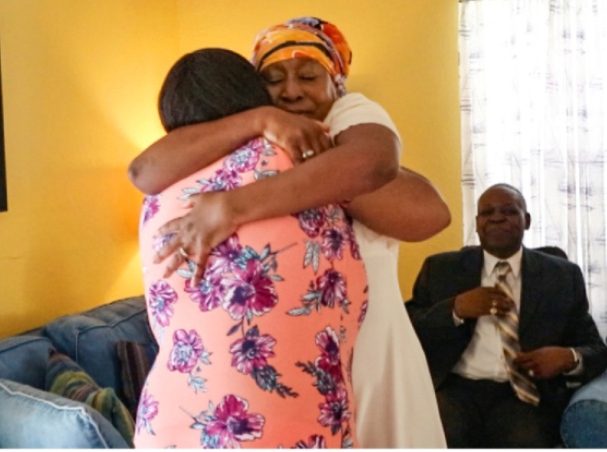Mikalin Watson-Cheesman is proud of her first name.
米卡林·沃森·奇斯曼對(duì)自己的名字感到自豪,
It's short for Mika Linette, a combination of the two most important parts of her identity:
它是米卡·林諾特的縮寫(xiě),她的身份中兩個(gè)最重要的部分的結(jié)合:
Mika, the name she chose for herself when she became an adult,
米卡,是她成年后給自己起的名字,
and Linette, the name her birth parents gave her—the name she didn't know until she was 46.
林諾特是她的生父母給她的名字-這個(gè)名字她46歲時(shí)才知道。
Mikalin still remembers the exact moment she was separated from her mother, on September 24, 1975.
米卡林仍然清楚地記得自己和母親分離的時(shí)刻,那是1975年9月24日。
Then just four years old, she and her mother were walking through Penn Station in New York City.
那時(shí)她只有四歲,她和母親走在紐約市的賓州車(chē)站,
Mikalin recalls that her mother seemed nervous, frequently stopping in her tracks to rummage through her purse.
米卡林記得自己的母親似乎很緊張,經(jīng)常停下來(lái)翻著自己的錢(qián)包。
Mikalin spotted a candy store and asked whether she could go in. She thought her mother said yes, so she started browsing.
米卡林看到一個(gè)糖果店,問(wèn)母親她能不能進(jìn)去。她以為母親說(shuō)了可以,所以她就進(jìn)店去逛。
"The guy behind the counter asked if I wanted candy," she says. "I said, 'I'll go ask my mom,' and she was gone."
“柜臺(tái)后面的人問(wèn)我要不要糖果,”她說(shuō)。“我說(shuō),‘我去問(wèn)問(wèn)我媽媽?zhuān)呀?jīng)不見(jiàn)了。”
A police officer found the girl wandering around the train station alone.
一位警官發(fā)現(xiàn)小女孩自己在車(chē)站溜達(dá)。
When he asked whether she knew which direction her mother went, she shrugged. She wouldn't speak to anyone.
當(dāng)他問(wèn)女孩是否知道她母親往哪個(gè)方向走時(shí),她聳了聳肩。她不和任何人說(shuō)話(huà)。
Before long, she was placed in a Catholic orphanage. The nuns running it gave her a name—Missy—because the girl still wouldn't talk.
不久,她就被送到一家天主教孤兒院。經(jīng)營(yíng)孤兒院的修女給她起了個(gè)名字——米茜——因?yàn)槟莻€(gè)女孩還是不肯說(shuō)話(huà)。
The case hit newsstands when the New York Post ran an article on her, asking "Where is Missy's mother?" No one answered.
《紐約郵報(bào)》發(fā)了一篇關(guān)于詢(xún)問(wèn)她的母親是誰(shuí)的文章后,這個(gè)案子引起了報(bào)攤熱議,沒(méi)人知道答案。

Two years later, when she was six, she was adopted. Her new family named her Michelle.
兩年后,六歲的她被收養(yǎng)了。她家人給她取名叫米歇爾。
Once she finished high school, she moved out, changed her name to Mika, and traveled the country.
高中畢業(yè)后,她搬了出去,改名為米卡,去國(guó)家旅行。
She married and divorced twice and raised five kids, all the while trying to find her birth family.
她離了兩次婚,養(yǎng)了五個(gè)孩子,同時(shí)也在努力尋找她的出生家庭。
In 2001, desperate for any information, she posted on a genealogy website that she had been left at Penn Station and was searching for her birth mother.
2001年,她急切地想要得到一切信息,于是她在一個(gè)族譜網(wǎng)站上發(fā)帖稱(chēng),自己被留在了賓夕法尼亞車(chē)站,正在尋找生母。
Lynn-Marie Carty, a Florida-based private investigator and founder of reunitepeople.com, saw the message and sent Mika her phone number.
林恩-瑪麗·卡蒂是佛羅里達(dá)州的一名私家偵探,也是reunitepeople.com網(wǎng)站的創(chuàng)始人。她看到了消息給米卡發(fā)了她的電話(huà)號(hào)碼。
"I called her up and she said, 'I wanna help you. Don't worry about sending me any money or anything.
“我給她打電話(huà),她說(shuō),我想幫助你。我不要你的錢(qián)或任何東西。
I'm just going to help you,'" Mikalin says. Carty worked the case on and off for 16 years without a breakthrough.
我就是單純地想幫助你,米卡林說(shuō)。卡蒂斷斷續(xù)續(xù)地跟了這個(gè)案子16年,沒(méi)有一點(diǎn)突破。
In December 2017, she sent Mika a DNA test as a Christmas present.
2017年12月,她送了米卡一個(gè)DNA測(cè)驗(yàn),作為圣誕禮物。
After running the results through several databases, Carty found that Mika was a match with a woman named Kelly Warren, who appeared to be Mika's first cousin.
卡蒂在幾個(gè)數(shù)據(jù)庫(kù)中查找結(jié)果后發(fā)現(xiàn),米卡與一位名叫凱利·沃倫的女子配對(duì),后者似乎是米卡的表妹。
Carty called Kelly, who was initially skeptical of the whole story but eventually agreed to help.
卡蒂給凱利打了電話(huà),凱利起初對(duì)整個(gè)故事持懷疑態(tài)度,但最終還是同意幫忙。


